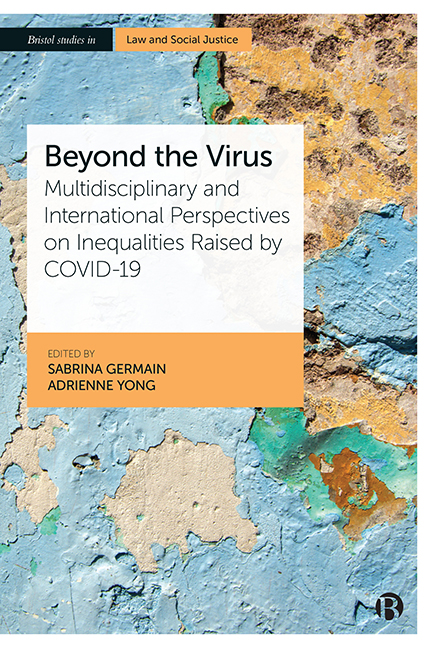 Beyond the Virus
Beyond the Virus 2 - Beyond Authority and Governance in Israel during the COVID-19 Pandemic: A Crumbling of Solidarity and the Rise of Social Inequalities
Published online by Cambridge University Press: 17 January 2024
Summary
Introduction
Responding to the COVID-19 pandemic has been a major challenge for societies around the globe. In addition to its health and economic impact, the pandemic led to tension between some of the fundamental principles of Western societies. One example is the clash between human rights and solidarity (Prainsack and Buyx, 2011). The aim of leading a normal life in circumstances of a pandemic – on the personal, community and societal levels – requires that people act in a solidaric manner and that they commit to assisting one another. At the same time, basic human rights need to be respected. Adhering to both these principles will often not be possible, because promoting one may compromise the other. For example, a societal agreement to be in a lockdown to bar the spread of the pandemic may compromise individuals’ freedom of movement.
In view of this tension, the law must attempt to find a balance between promoting public health and protecting human rights. Thus, on the one hand, it must step in when the level of community-based or society-based solidarity is low and mutual assistance between people is insufficient in the face of the pandemic. In this situation, governments may have to impose legal restrictions on the public’s behaviour. On the other hand, the law may reflect practices of solidarity. For example, if there is a public consensus to protect the elderly by preventing their relatives from visiting them, the law may reflect this agreement, taking into account that such a legal measure infringe one’s rights.
The aim of this chapter is to examine the role played by Israeli law in responding to the pandemic during the period prior to the vaccine campaign (from February 2020 until December 2020). We set to investigate to what extent legal measures were needed to mitigate the spread of the pandemic. We also examine whether the legal response to the pandemic reflected the practices of solidarity on the community and societal levels or that they were adopted to deal with relatively low levels of solidarity.
To accomplish this, we examine the protocols of meetings of various committees in the Israeli parliament (the Knesset) that discussed the public health restrictions.
- Type
- Chapter
- Information
- Beyond the VirusMultidisciplinary and International Perspectives on Inequalities Raised by COVID-19, pp. 34 - 55Publisher: Bristol University PressPrint publication year: 2023


